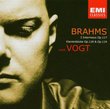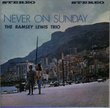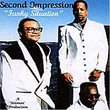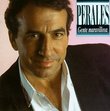| All Artists: J.S. Bach, Abo, Koopman Title: Complete Cantatas Members Wishing: 1 Total Copies: 0 Label: Challenge Classics Original Release Date: 1/1/2010 Re-Release Date: 2/9/2010 Album Type: Box set Genre: Classical Style: Symphonies Number of Discs: 67 SwapaCD Credits: 67 UPC: 608917235029 |
Search - J.S. Bach, Abo, Koopman :: Complete Cantatas
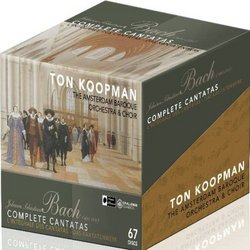 | J.S. Bach, Abo, Koopman Complete Cantatas Genre: Classical A complete set of the acclaimed Bach Cantatas! |
Larger Image |
CD DetailsSynopsis
Album Description A complete set of the acclaimed Bach Cantatas! Similar CDs
|
CD ReviewsExcellent music - presentation/organization could be better R. Lane | Tracy, CA USA | 02/11/2010 (4 out of 5 stars) "There are already myriads of reviews of the musical merits of Koopman's Bach Cantata cycle with the original 3-CD issues. I will not endeavour to compete with them, or try to do a thorough review of the musical merits of Koopman's great achievement (to borrow another reviewer's expression). Briefly I find Koopman a nice "middle-ground" interpretively. He never goes to the almost romantic extremes I sometimes sense with Gardiner. But he is far more empathetic in his interpretations where I frequently find Suzuki bordering on cold. The Amsterdam Baroque Orchestra is very good, and the same goes for the choir. The choir never rises to the level of Herreweghes Collegium Vocale Ghent, nor does the orchestra ever reach the heights of beauty and precision of the English Baroque Solosits. But, Koopman's forces never disappoint. They are always more than just "adequate". Artistically though, the greatest asset this set has going for it is not Koopman's direction, the choir, or the orchestra. No, the star here (and a very bright shining start at that) is the bass soloist Klaus Mertens. Mertens rarely has any serious competition elsewhere. The other soloists are certainly noteworthy, and I particularly relish the moments with Christoph Pregardien and Nathalie Stutzmann. But Mertens is totally in another class by himself. Worth the cost, even if you already all of the cantatas in another series. The collection of this magnificent cycle in a compact box is certainly welcome. When compared to the 22 chubby jewel cases, this saves a great deal of shelf space and provides very convenient access. The CDs come in cardboard sleeves. The backs of the sleeves list each work and the track range for the work. This is better than many other recent issues, which often just list the works on the back of the sleeve but not the range of tracks for each work. So, with this set at least you can grab a CD in the sleeve and not need to consult the booklet to know where to start a particular work. It would have been nicer if the individual track contents were listed also. Then you would know what track to go to for a particular item. But this is good enough. And far better than paper sleeves. The box is top-hinged and very sturdy. The booklet. Oh, the booklet. The bugaboo of most CD issues these days. The booklet DOES have: Track names and vocal artist listings. The booklet DOES NOT have: Sung texts (or translations). Recording information (dates/locations). Instrumental artists Any literature about the works, the artists, or the project. An index of the works (CRITICAL omission!!) The lack of an index of the works in the booklet (or an accomanying CD-ROM) is certainly the most notable drawback of this issue. The cantatas are arranged on the CDs in the original order that they were issued over the 10+ years they were recorded. They ARE NOT arranged numerically. Without an index, it is very difficult to locate an individual cantata among the 67 CDs. And that is what keeps me from giving the set 5 stars. A 2-3 page index at the back of the booklet would certainly not have cost the manufacturer more than a few pennies, perhaps even fractions at that! " Koopman's Achievement Joseph L. Ponessa | Glendive MT USA | 02/10/2010 (5 out of 5 stars) "The Low Countries formed part of the musical world of Bach's time, when many fine organs were built there as well as Germany. Christian Müller built the 1727 organ at the Grote Kerk in Leeuwarden, the 1734 organ at the Waalse Kerk in Amsterdam and the 1738 organ at St Bavokerk in Haarlem while Bach was still living and writing his later cantatas and organ works.
Co-heirs of Bach with the Germans, then, the Netherlanders have had a prodigious impact on Bach recording in our time. Only a handful of Bach specialists have attempted to record cantata cycles, but these include the Belgians Kuijken and Herreweghe along with the Dutchmen Leusink and Koopman. Mention must be made as well of the fact that Suzuki is a lifelong member of the Dutch Reformed Church. Their cycles differ in approach, but share the general characteristics of musicality, spirituality, textual sensitivity and the use of historically authentic instruments. None of these cycles use boy soloists. (Only Harnoncourt/Leonhardt did.) Bach's soloists were boys, but in those days boys often retained their treble voices until their late teens, and produced a sound more robust than the treble soloists of today. Leusink uses the Holland Boy Choir, which sets his cycle apart from the others sonically. After giving the matter considerable thought and some research, I have decided that the use of women's voices in the choir is in fact historically accurate, especially for the chorale cantatas of 1724. The whole congregation knew and joined in the singing of the choral movements of those cantatas, and the congregation included women. The use of reduced choral forces by Kuijken and Koopman is less close to the practice of Bach's time, but Bach was aiming to expand to the four corners of a church while the purpose of a recording is to expand to the four corners of my living room. Dense choral passages that are clear in church may very well end up muddled in the living room. Another consideration is that, for a very long cycle of material like this, the casting and logistics are much easier for a small ensemble than for a large one. The result will be greater consistency and quality control throughout the whole span of the cycle. Kuijken's fewer voices do not sing as well as Koopman's, and so Kuijken's partial cycle is consistently less good than Koopman's complete one. Koopman's recorded sound is soft, lacking in the zing of some other cycles. Suzuki, Kuijken and even Harnoncourt give greater sonic thrills. Koopman is capable of such things, as he proves in his stylus phantasticus recording of Buxtehude's organ works. He seems to have made the conscious decision, together with his sound engineers, that Bach's cantatas are intended to meet us where we are and lift us up, rather than to descend upon us from on high. As a result, in a one-on-one comparison of individual cantatas, Koopman's recordings will often sound subdued, but the Koopman cycle as a whole is eminently listenable and carries the listener along upon a long but gentle journey. The individual releases in this cycle may have had more liner notes than this big collection--never having bought any of the individual releases, I can't compare. The price advantage of this complete collection, however, is considerable. In my enthusiasm I imported the box from Germany, when it was released several months earlier. My box cost about a hundred dollars more than the American release, but still cut deeply into the overall cost of trying to buy the discs severally. Koopman's cycle is more comprehensive than any other. He includes not just the sacred cantatas, but also the arias, minor Masses and secular cantatas. That is why the package is called the "Complete Cantatas." Put on the shelf alongside Koopman's recording of all the Bach organ works (which include many choral preludes linkable to the cantatas) and other keyboard and instrumental works, this cantata set demonstrates that Koopman is responsible for recording more of Bach's output than any other individual. Koopman did not begin to record the Bach cantatas until he had finished recording all of the organ works. How many Bach specialists have recorded complete cantata cycles? A handful. How many organists have recorded complete Bach organ cycles? A couple of handful. How many have recorded both? Just Ton Koopman. I say again, Koopman alone." |

